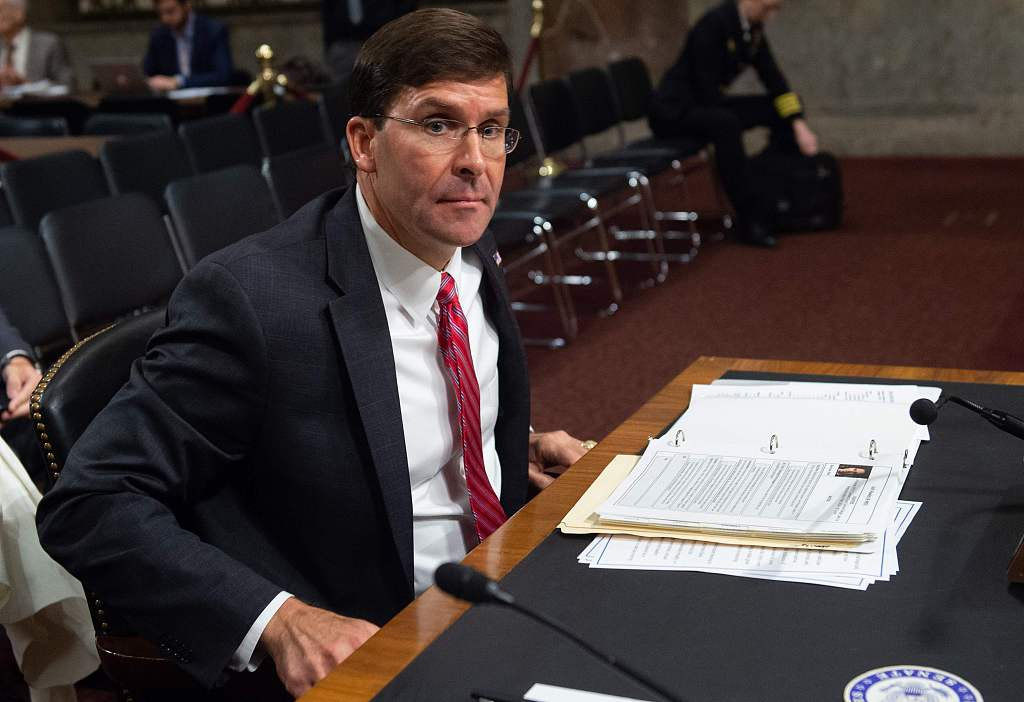

Editor's note: Andrew Korybko is a Moscow-based American political analyst. The article reflects the author's opinions and not necessarily the views of CGTN.
On Sunday, newly inaugurated U.S. Secretary of Defense Mark Esper scandalously blamed China for destabilizing the Indo-Pacific even though it is his own country's actions that have led to that outcome. His exact words were: "We also stand firmly against a disturbing pattern of aggressive behavior, destabilizing behavior from China. This includes weaponizing the global commons, using predatory economics and debt for sovereignty deals, and promoting state-sponsored theft of other 'nations' intellectual property."
He made his remarks while speaking to reporters during his first overseas trip, which will see him visiting New Zealand, Japan, Mongolia, and the Republic of Korea (ROK) after departing from Australia. On his way to the Eastern Hemisphere, he told the press that "our strategic competitors are China and Russia, principally in that order," and that's why "I want to go out to the theater, visit with some of our longest-standing allies, and new partners, and to affirm our commitment to the region to reassure our allies and our partners."

Then U.S. Secretary of the Army Mark Esper, nominee to be Secretary of Defense, leaves after testifying during a Senate Armed Services Committee confirmation hearing on Capitol Hill in Washington, DC, U.S., July 16, 2019. /VCG Photo
It's therefore unsurprising that he used this occasion to fearmonger about China, seeing as how the entire purpose of his regional tour is to hype up the so-called "threat" that he claims it poses to strengthen the multilateral "containment" alliance. That said, Defense Secretary Esper's comments about China's supposedly destabilizing activities in the Indo-Pacific are much more pertinent when describing his own country's behavior.
The U.S. is the one that's weaponizing the global commons through its so-called "Freedom Of Navigation Patrols" in the South China Sea. The predatory economic behavior of American-led international financial institutions in the past is what helped contribute to the growing appeal of China's much more responsible lending practices in the first place. Furthermore, Edward Snowden's explosive revelations exposed the U.S.' global spying network that's also obviously engaged in economic espionage among its many other activities.
Even if it wasn't for these self-evident facts, it reasons that China has absolutely no interest in interfering with shipping across the global commons through which the vast majority of its international trade traverses. Not only that, but it also doesn't have anything to gain by emulating the same failed financial practices as the U.S. in weaponizing international loans for geostrategic purposes. Nor, for that matter, does China want to risk jeopardizing relations with its many Belt and Road Initiative (BRI) partners by spying on them.

An attendee of a rally in the U.S. carries a sign reading "Keep America Great!" /VCG Photo
The U.S., however, has every reason to engage in these activities. Increasing its military presence in the global commons puts pressure on the world economy by reminding everyone that America can disrupt free trade at any time of its choosing, thus holding the entire international community hostage. As the world's indisputably predominant economy immediately after the Cold War, the U.S. also exploited its leading position to take advantage of desperate countries that were in dire need of international financial assistance.
That's all changing nowadays, however, since the U.S. is being challenged by China's rise, which is making it much more difficult for Washington to continue with its tricks. This explains why Defense Secretary Esper said that China is his country's top strategic competitor because it presents a credible alternative to the previous unfair state of affairs that only worked out to America's advantage. China's win-win model is becoming so popular across the world that the only response the U.S. can resort to is desperately trying to discredit it in vain.
By accusing China of the exact same destabilization tactics that the U.S. itself has been doing, Defense Secretary Esper is trying to confuse the international community, but the result is that his scheme only draws more attention to America's own activities in this respect. The global audience is already well aware of this, and that's why the U.S.' soft power is declining across the world while China's is on the upswing. The U.S. could gain so much by cooperating with China, but instead, it stubbornly refuses to since it can't countenance losing its dominance.
(If you want to contribute and have specific expertise, please contact us at opinions@cgtn.com.)

Copyright © 2018 CGTN. Beijing ICP prepared NO.16065310-3
Copyright © 2018 CGTN. Beijing ICP prepared NO.16065310-3